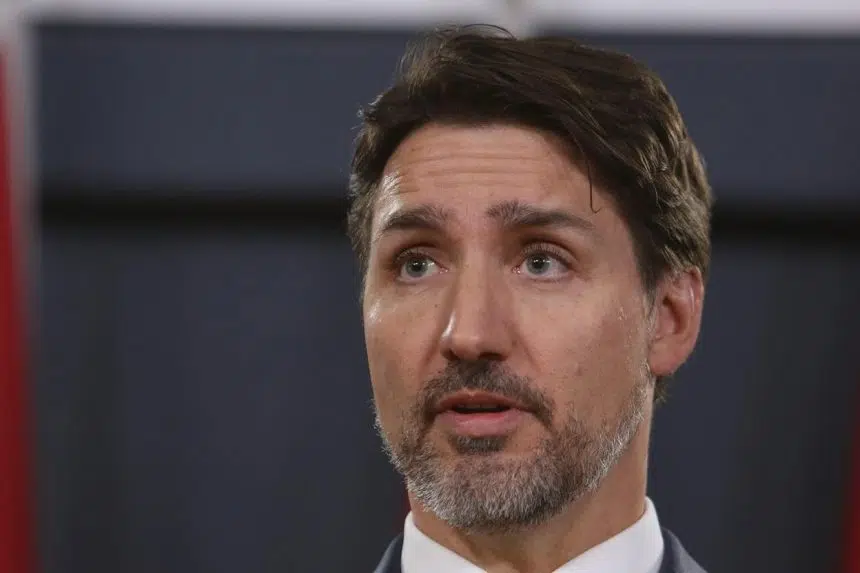OTTAWA – Prime Minister Justin Trudeau will address the nation Monday as governments and businesses take drastic measures to stem the spread of COVID-19.
Canada is facing an unprecedented slowdown of daily activities as schools, public libraries and recreation centres, fitness clubs, clothing retailers, and restaurants temporarily close or scale back services.
Trudeau is scheduled to speak to Canadians at 11 a.m. CT, to update new actions the government will take following a cabinet meeting in Ottawa on Sunday. Trudeau remains in self-isolation at his Ottawa home after his wife, Sophie Gregoire Trudeau, tested positive for COVID-19 after returning from a trip to London. Trudeau chaired the cabinet meeting remotely.
While many governments have said all options are on the table to try and prevent the tragic and rapid explosion of virus cases in Canada that has hit some European countries, Ontario tried to calm frayed nerves noting at this point Ontario is not considering a full societal lockdown like Italy has done.
“Ontario is not currently considering a lockdown in response to COVID-19,” tweeted Prabmeet Sarkaria, the Ontario associate minister of small business Sunday afternoon. Premier Doug Ford retweeted that comment and said Ontarians should make sure to get their information from credible sources.
As of early Monday, there were 324 confirmed cases of COVID-19 in Canada, and 17 probable cases. The Public Health Agency of Canada reported that 13 per cent of those cases required hospitalization. Almost three-quarters of the cases were people who travelled outside of Canada recently, but public health officials also stressed there is community transmission happening now more frequently.
The number of cases over the weekend almost doubled, prompting an escalation in the message to Canadians from Dr. Teresa Tam, Canada’s chief public health officer.
“Our window to flatten the curve of the epidemic is narrow,” Tam said Sunday. “We all need to act now. COVID-19 is a serious public health threat.”
If people don’t stay home in an effort to “social distance,” the virus will spread so quickly that too many people will need urgent medical care at once, she said.
As a result, many businesses and governments directed employees who can to work from home Monday, and several non-food retailers and fitness clubs announced they will be closing temporarily and telling employees to stay home.
Thirty executives from some of Canada’s biggest companies issued a call to the Canadian business community to make slowing the spread of the virus their only priority.
“We urge every leader in the country to immediately shift focus to the singular objective of slowing the pace of transmission of this coronavirus,” the executives wrote in an open letter published in The Globe and Mail.
The group of 30 executives, which includes the leadership of the country’s largest banks, resource companies and others, say they stand united in the shared fight against the virus and expect economic pain but that not taking these drastic actions will lead to an even worse outcome. They are urging companies to prohibit all non-essential travel, allow employees to work from home for non-critical functions, ensure sick pay and mental health supports are in place and to cancel in-person events.
“While this will have significant economic impact on our businesses in the short term, it is critical to weathering this storm and will hasten the recovery,” the letter said.
“Governments across the country have acted yet these measures will only be effective if all employers step up and do their part to protect the nation’s health and welfare.”
After a weekend of criticism about lax implementation of warnings to travellers arriving in this country, the Canada Border Services Agency also said today it is adding new screening questions trying to identify people who have symptoms of COVID-19. Montreal and Halifax are among cities who dispatched police and local health workers to airports to try and get the message across to people arriving from outside Canada, after many travellers reported customs officials were not all telling new arrivals that information.
Public health officials want anyone returning to Canada to voluntarily self-isolate for 14 days.
The border-services agency said Monday automated questionnaires administered by touchscreens at entry points are now asking whether people have coughs, difficulty breathing or a feeling of feverishness. They will also require arrivals to acknowledge that they’re being asked to self-isolate.
Mia Rabson, The Canadian Press







